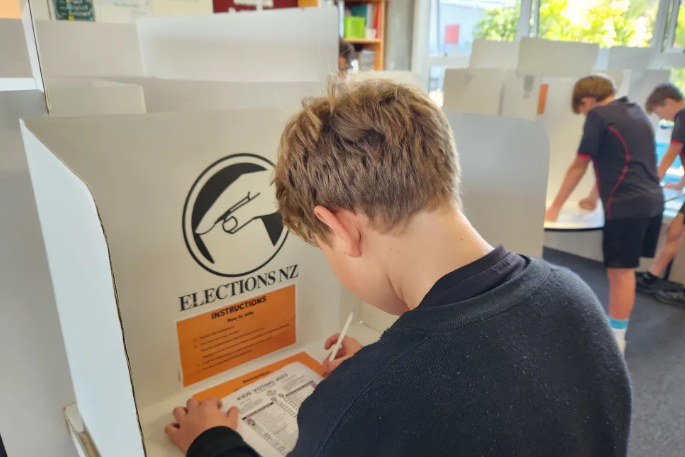School students are getting a jump on the rest of the country and heading to the polls with a mock election.
About 115,000 children, at 775 schools are voting for the same parties standing in the general election, plus the candidates from their local electorates. The Electoral Commission has given schools ballot boxes, voting booths and voting papers to make the experience as realistic as possible.
At Remuera Intermediate School, Sameer was in charge of keeping the kids lined up as they came to take part.
"You go in, get your voting paper then you go vote. Put your vote in the ballot box."
Norah is on the publicity team and asked them whether teenagers should be allowed to vote.
"They think teenagers don't have rights to vote in the future because they don't have a full mind of what's going on when voting and some people say 'yes teenagers should vote'."
Maelee says she was looking forward to exercising her democratic right when she turned 18.
"I think more youth when they get to that age, as well as Māori and Pasifika, should vote more because there is a big percentage that is not voting."
Teacher Julie Miller says 21 students from years 7 and 8 took six weeks to plan out their 'election day'.
"We know that the earlier we teach kids about anything the more involved they'll be. Running it like this, where they can actually be a part of planning it, be a part of practising voting in a mock election means they're a lot more prepared and engaged in the future," she says.
Electoral Commission deputy chief executive operations Anusha Guler says there was generally a low uptake of youth in the elections.
"The earlier you start with creating an awareness of elections and the power of the vote, it gets them more involved in the process."
The students says they would not have been as engaged in the election without the Kids Voting programme. Riaan, Lila and Jiu says they had learned how Parliament worked, how a government was chosen and that the public was free to vote for anyone standing.
Deciding the leader of the country was really important, Luka says, and is "something most people should do". Sawyer says he liked learning about what views and morals they shared with the parties and who the local candidates were.
As to who they're voting for, Sameer and William were not giving anything away.
"I think all the candidates are good. Everyone is good," says Sameer.
"I'm considering options," replied William.
The results of the student's voting will not be released until after the election.



0 comments
Leave a Comment
You must be logged in to make a comment.